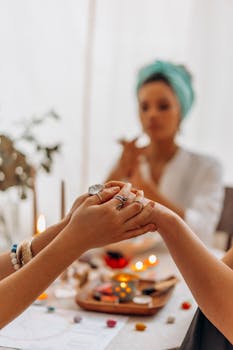What is ritual creation?

What is Ritual Creation?
Ritual creation is a fascinating process that weaves intention and routine into meaningful activities. By establishing rituals, we can enhance our productivity and foster personal development in our daily lives. It’s about transforming mundane tasks into powerful practices that help us navigate the chaos of modern living. Let’s explore the significance of ritual creation, its psychological benefits, and how you can start crafting your own rituals today.
Understanding Ritual Creation
Ritual creation is the practice of designing meaningful activities that we perform regularly with intention. These rituals serve various purposes, from enhancing productivity to promoting mental well-being. At its core, ritual creation is about establishing a personal or communal routine that brings clarity, focus, and a sense of purpose to our lives.
Definition and Origins
Historically, rituals have played a crucial role in many cultures and societies. From religious ceremonies to seasonal celebrations, rituals have been used to mark significant events and transitions. Over time, the concept has evolved, and today, ritual creation can be adapted to fit personal circumstances and goals. It allows us to infuse our daily lives with intention and meaning, bringing us closer to our aspirations. For a deeper understanding of this evolution, check out The Wild Mystic Woman’s Guide To Creating Rituals.
Psychological Benefits
Engaging in ritual creation offers several psychological benefits. Research shows that rituals can enhance focus, reduce stress, and improve overall mental well-being. By establishing a routine, we create a sense of predictability and stability in our lives. This can buffer against anxiety and help us cope with uncertainty. To discover how everyday rituals can enrich your life, explore How Everyday Rituals Can Add Meaning to Your Life.
The Process of Ritual Creation
Creating effective rituals involves several steps. It’s not just about picking an activity; it’s about aligning that activity with your intentions and goals.
Identifying Your Intentions
The first step in ritual creation is to identify your intentions. What do you want to achieve or feel through this ritual? Clear intentions act as a compass guiding the design of your ritual. Whether you seek calmness, focus, or motivation, defining your purpose will inform the elements you incorporate.
Designing Your Ritual
Next, consider the elements of your ritual. This includes timing, location, and the specific activities you wish to undertake. Choose a space that resonates with your intentions. For instance, if your goal is to cultivate mindfulness, a quiet corner in your home can be ideal for meditation. Explore 4 Steps to Creating a Personal Ritual for more insights on structuring your ritual.
Consistency and Adaptation
Consistency is key in ritual creation. Regular practice can help reinforce the desired outcomes. However, it’s also essential to remain adaptable. Life is dynamic, and your rituals should evolve to meet your changing needs. Embrace flexibility and modify your rituals as necessary to keep them relevant and effective.
Examples of Effective Rituals
Let’s explore practical examples of rituals tailored to different contexts, including work, study, and personal life.
Morning Rituals for Productivity
Kickstart your day with morning rituals that set a positive tone. Consider incorporating activities like stretching, journaling, or enjoying a nutritious breakfast. Engaging in these practices helps to prioritize your well-being and boost your productivity throughout the day. For ideas on meaningful morning activities, read about 8 everyday ritual ideas for a more mindful life.
Study and Work Rituals
During study or work sessions, rituals can enhance concentration and effectiveness. Create a focused environment by decluttering your workspace and lighting a candle. Use techniques like the Pomodoro Technique, where you work for 25 minutes, then take a 5-minute break. Such rituals can improve your focus and make your work sessions more productive.
Evening Rituals for Reflection
Evening rituals are essential for winding down and promoting restful sleep. Consider activities like reading, practicing gratitude, or meditating before bed. These calming practices help you reflect on the day and prepare your mind for a peaceful night. Discover more about creating personal rituals here.
Incorporating Ritual Creation into Daily Life
Incorporating ritual creation into your daily life can be a transformative experience. Here are some tips to get started.
Starting Small
Begin with small, manageable rituals that fit seamlessly into your daily routines. It could be as simple as a 5-minute breathing exercise in the morning or a gratitude practice before bedtime. Starting small allows you to build confidence and gradually expand your rituals.
Building a Ritual Toolkit
Create a toolkit to support various rituals. This might include items like journals, candles, or essential oils. Having these tools readily available can make it easier to engage in rituals consistently. Over time, you’ll discover which elements resonate most with you, allowing you to refine your toolkit.
Conclusion and Final Thoughts
Ritual creation is more than just a trend; it’s a powerful way to enhance productivity and well-being in our fast-paced lives. By establishing meaningful rituals, we can bring focus and intention to our daily activities. I encourage you to experiment with your own rituals and observe how they impact your life. Whether you want to improve your work-life balance or develop effective study habits, ritual creation can be your ally in achieving your goals. So go ahead, embrace the art of ritual creation and watch how it transforms your everyday experiences!